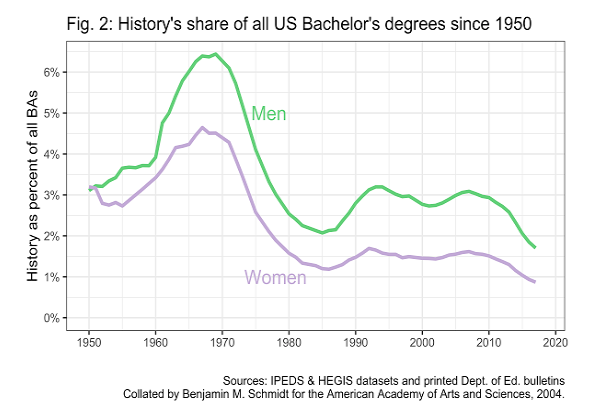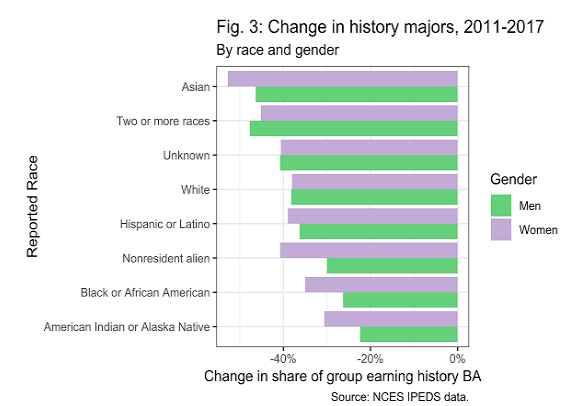Is the history major going extinct? For the past decade, history has been declining faster than any other major, even as more and more students attend college. Some universities are even eliminating the department. And the total number of majors nationwide has dropped by a third since 2011. Meanwhile, various journalists and scholars have argued that the humanities are in crisis, implying that historical and critical thinking may be on their way out.
The number of students earning history has dropped steadily since its peak in the 1960s and 1970s. The first significant decline in the number of majors occurred during the 1970s, during a cultural shift in what students hoped to get out of college. In 1970, seven out of ten students thought that education should help them “develop a meaningful philosophy of life,” while four out ten thought that it should help them “make more money.” By the mid-1980s, these numbers had flipped. There was a similar change in student attitudes around 2011, this time specifically about one’s major. The Class of 2011 was the first to enter college after the 2007-2008 financial crisis. Incoming first years experienced intergenerational pressure about their career prospects and assumed enormous debt during a time of economic instability. As such, many of them flocked to majors in STEM or pre-career tracks such as nursing, business, and education. But students have not returned to history since the economic crisis. Instead, it appears that 2011 marked a turning point in how students thought about what a college major means, linking it closely with future career prospects.This shift has translated into fewer students graduating with history degrees.

Some other changes over the past decade besides new students values can help explain why the number of history majors has dwindled. As state politicians have fought to disband teachers unions and cut benefits across the country, but particularly in the Midwest, regional universities that used to train public school history teachers have seen less interest in those programs. The University of Wisconsin–Stevens Point eliminated its history department entirely, and other schools may follow suit. At the same time, newer majors, such as Women and Gender Studies or African-American Studies have drawn students away from history courses and into those programs.
Although the numbers of history and humanities majors have shrunk nationally, Ivy League schools and military academies have not seen such drops. At Yale University, History is the most popular major for the Class of 2019. It is one of the most common majors at Harvard, Brown, Princeton, Columbia, and Dartmouth as well. Similarly, at West Point, the Naval Academy, and the Air Force Academy the number of humanities majors has stayed steady over the past decade. Ivy League universities and military academies share some important features: they are able to give generous financial aid, or require no tuition at all, respectively. At military academies, students graduate with guaranteed employment for five years after college, while the prestige of an Ivy League university can provide students with good job prospects.These two notable exceptions to national trends regarding humanities majors only reinforce the hypothesis that students are abandoning the history major out of concern for future career options.
But here’s the thing: history majors don’t actually fare worse than other majors on the job market. Students have stuck with psychology in recent years, as it’s seen as more “practical” than history, but they earn about the same as history majors do. And a study by the University of Texas system shows that their history majors make more than zoology, ecology, and neurobiology majors. And so while students are allowing future employment opportunities to guide their college major decision, it appears that those choices are based on myths, rather on actual data.
The fact that students are misguided in overlooking a history degree does not mean that their decisions do not have important impacts. The drop in the number of majors means that departments are offering fewer advanced courses on a national level. However, enrollment in history courses has remained relatively constant, and so colleges are offering more introductory-level courses. As a result, students today may be less knowledgeable about the world than they used to be, and will have fewer opportunities to explore specific regions in depth.
The demographic characteristics of the students leaving the major is a clue into what can be done to counteract these national trends. Asian American students, who are already underrepresented in the history major relative to their share of all students, have moved away from the history major at the sharpest rates. Asian American women were less than half as likely to major in history in 2011 as in 2017. Meanwhile, African Americans and American Indians left the major at the smallest rates during that time period, particularly men of those races. Benjamin Schmidt, an assistant professor of history at Northeastern University explains this imbalance in changes across different demographic groups to the degree to which students see themselves reflected in history curriculums: African-American men have a more prominent role in many of the commonly told histories of the U.S. than Asian-American women.

So what can the field do to stave off the alarming drop in majors? First, as the demographic data and the popularity of Gender Studies and African-Americans Studies programs suggest, history departments nationwide should incorporate more non-white and non-male voices into their curriculums. Not only is it important, it is also in a department’s best interest. Second, departments can emphasize new methods, such as digital history, to draw in new students. And finally, the field can continue to emphasize the importance of studying history, especially because an apathy towards historical thinking has prevailed in recent years. Just don’t ask me how to do that last one. •
This post is part of a two-part series on the history major. The second will focus on Middlebury College. If you would like to share how you chose the history major or your opinions on the topic, please email ahgoldstein@middlebury.edu.